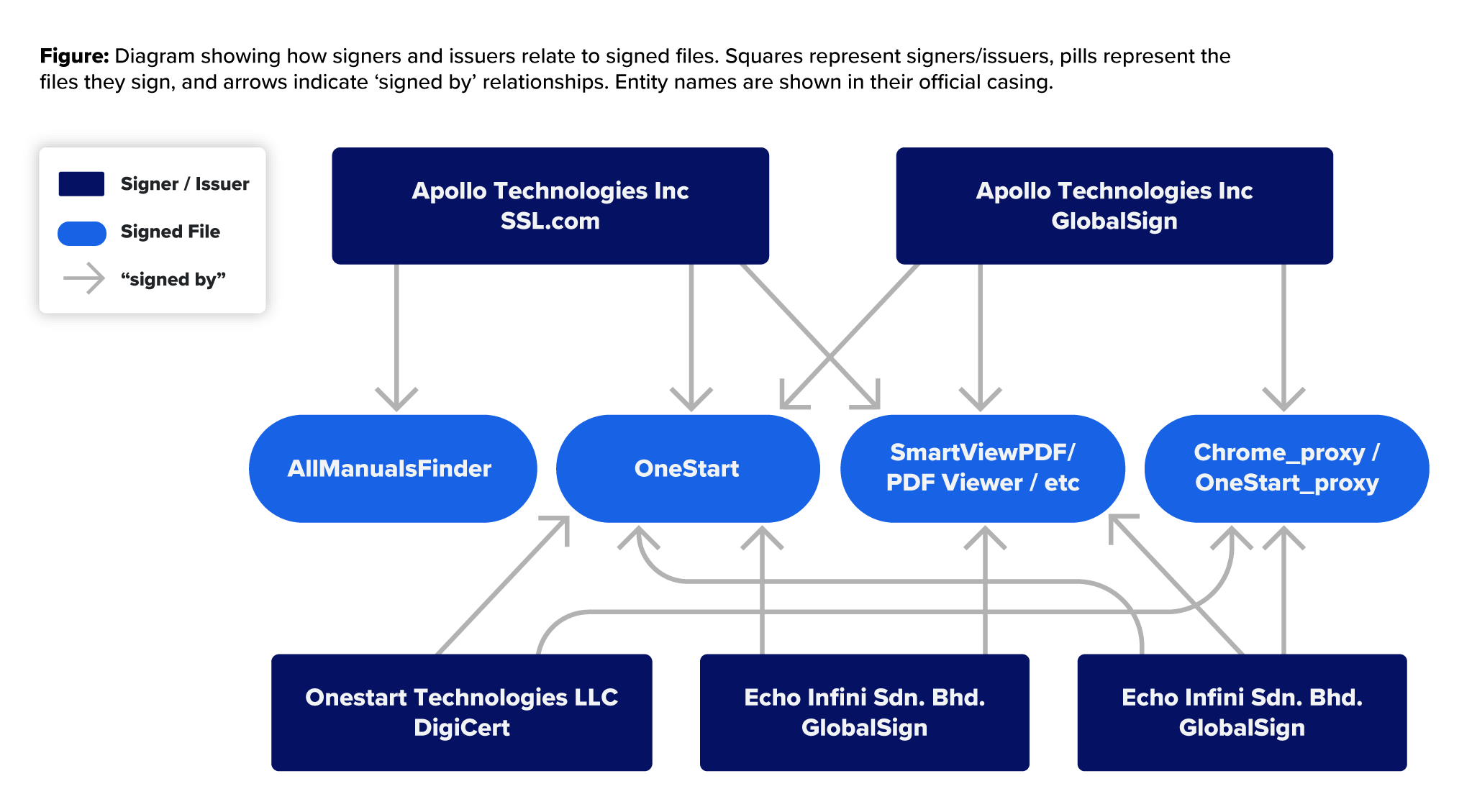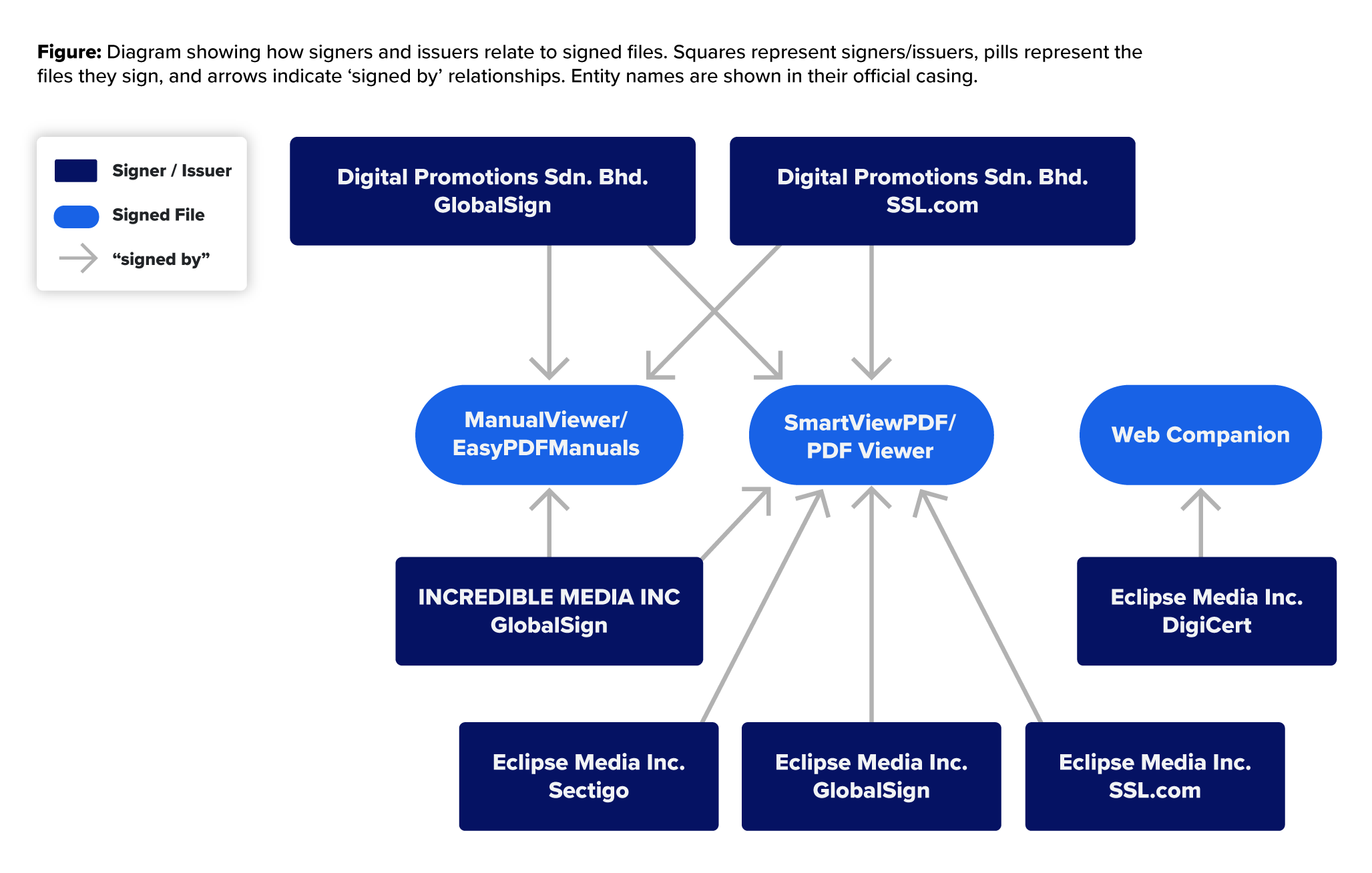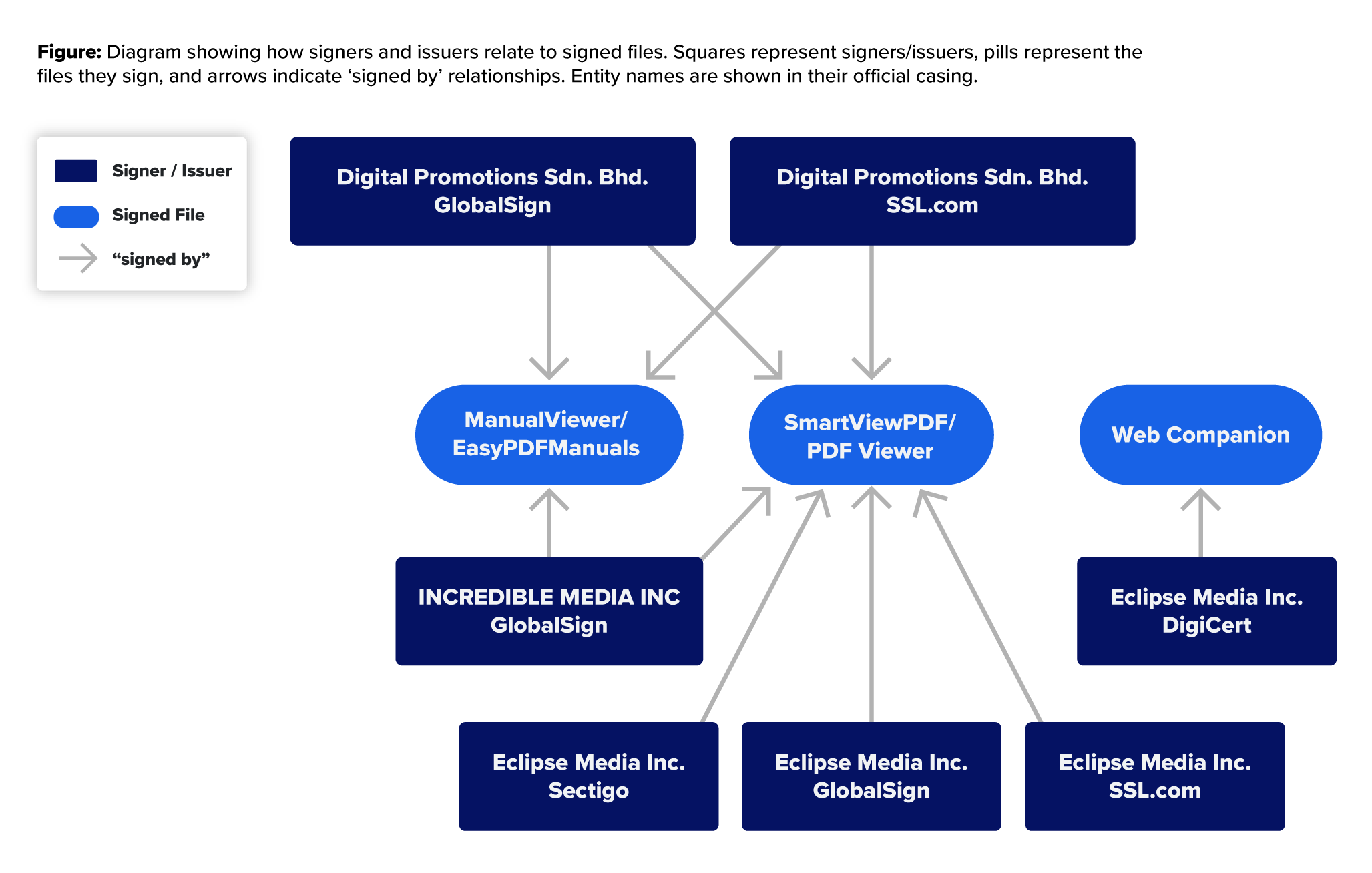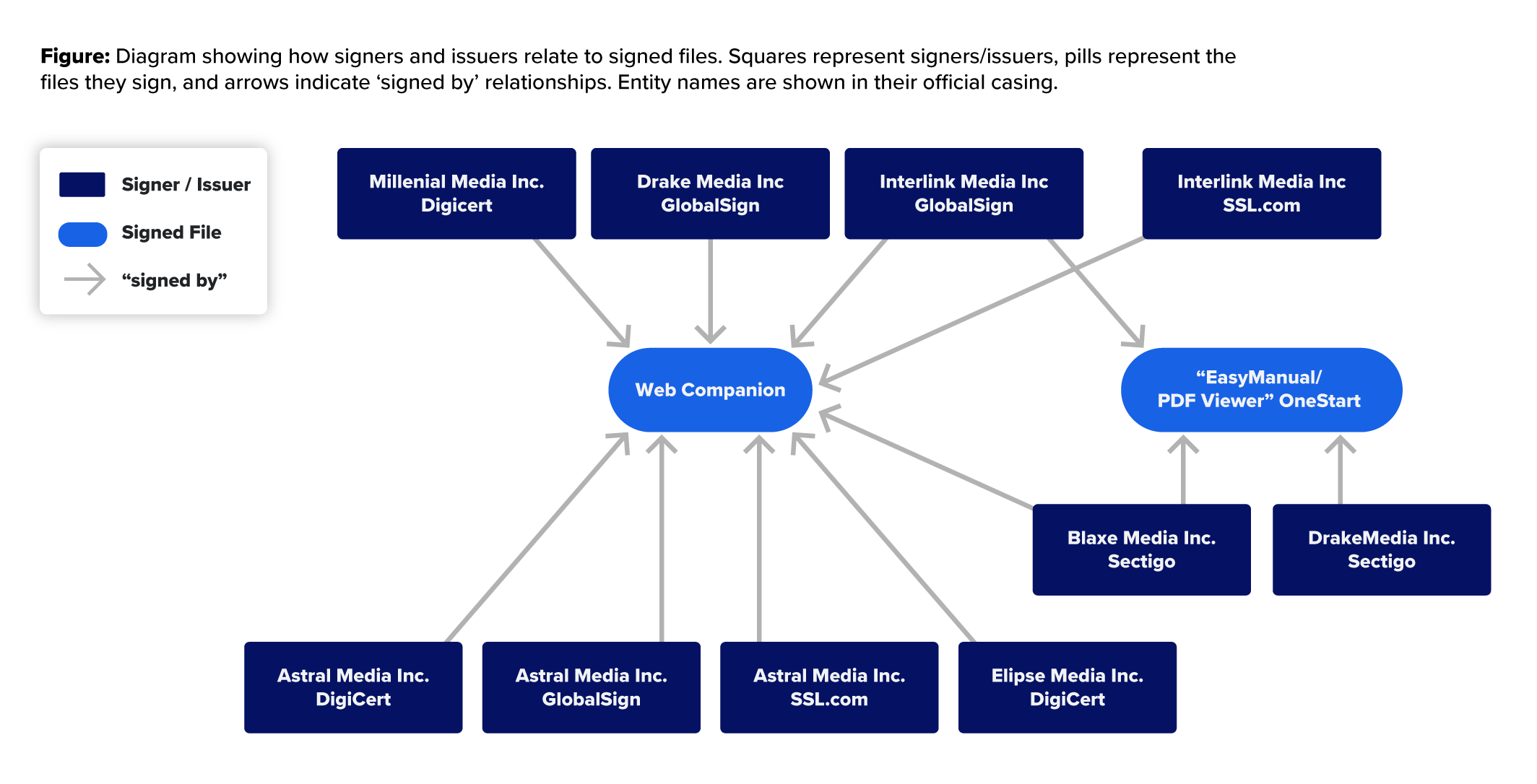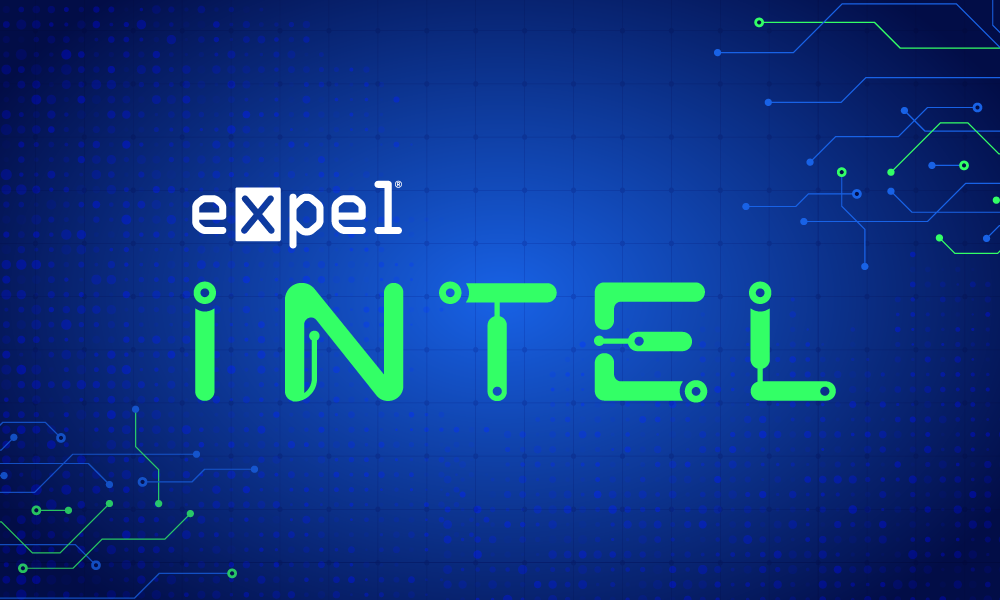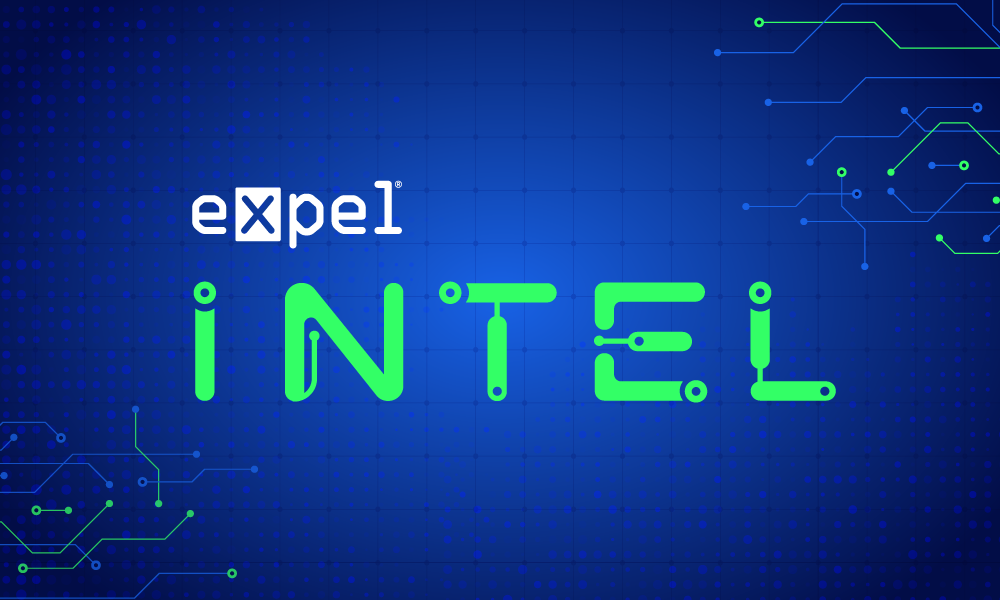Threat intel · 17 MIN READ · AARON WALTON · SEP 11, 2025 · TAGS: Get technical
This blog was created through a collaboration between Expel and the folks maintaining CertGraveyard.org.
TL;DR
- We demonstrate that the developers behind the recent AppSuite-PDF and PDF Editor campaigns have used at least 26 code-signing certificates over the last seven years to make their software appear legitimate.
- We track the malware under the name BaoLoader. Their software has generally been regarded as “potentially unwanted programs” (PUPs). However, recent analysis of the software and the actors’ connections to fraud suggest we should re-consider how we think about them.
- This analysis primarily focuses on code-signing certificate abuse. This gives us a high-level overview of the actors to define their history of behavior, but not a complete picture.
- We clarify how this malware is different from Chromeloader and TamperedChef. These names have been mistakenly applied to this malware, but the distinction is important for research and law enforcement.
What we’re tracking and why
Our analysis focuses on years of tracking a team of threat actors through mapping the actors’ use of code-signing certificates. These actors register new businesses for receiving authorization to generate code-signing certificates. Code-signing is a critical component used to validate the legitimacy of software. They then use these certificates to sign their own malware, often disguised as potentially unwanted programs (PUPs).
This particular analysis will focus on our research into the code-signing activity of the actors involved, connecting the threads between the businesses the actors have propped up to create certificates, the certificate authorities they’ve used to authorize them, and the pieces of software signed by these certificates.
Background on code-signing certificate abuse
To set the scene, it’s important to know how threat actors abuse code-signing certificates. These certificates have a unique ecosystem of exploitation, typically beginning with threat actors impersonating legitimate businesses to obtain them. Think of this impersonation as being similar to corporate identity theft, as the organizations listed on the fraudulent certificates are often victims themselves.
The purpose of code-signing is to grant trust to programs after their providers are vetted. The vetting process creates a chain of trust, starting with Microsoft trusting a certificate authority to vet software providers and determine whether they are trustworthy. Through the chain of trust, Microsoft then trusts the software provider’s certificate once the certificate authority signs it.This allows validation processes to trust software signed by that software provider’s certificate as well.
The certificate also contains a hash of the signed file, which is compared against a computed file hash. If the hashes match, the certificate is considered valid, indicating that the file hasn’t been tampered with. (See the articles from the following authors to learn more about code-signing and abuse: Axelarator, Expel.)
In most cases, cybercriminals abuse this system by impersonating businesses to receive a certificate. This impersonation may include creating domains imitating a company and using it to apply, modifying government databases to include their names and contact information, or other methods. In the case of BaoLoader, the actors registered legitimate businesses.
We believe with high confidence the malware “AppSuite-PDF,” “PDF Editor,” “ManualFinder,” “PDFTools,” “PDFProSuite,” and “OneStart” are distributed by the same team that buys certificates directly. Our data shows this team has been active over the last seven years. During this time, they’ve consistently maintained software that antiviruses have generally flagged as PUPs.
This analysis lays the groundwork for understanding and documenting their activity and exposes the threat actors’ code-signing certificate use over the last seven years.
The data
Expel is grateful for the opportunity to collaborate with CertGraveyard.org and relied heavily on its database for the creation of this analysis. Cert Graveyard has documented more than 1,500 unique organizations with at least one abused code-signing certificate. Cert Graveyard identifies certificates used to sign malware and reports them to their issuers for review and revocation.
Identifying BaoLoader as unique malware via certificates
When reviewing the abused certificates, we observed a high level of consistency which causes the actors to stand out:
- The actors used 15 code-signing certificates issued for companies in Panama. Out of ~1,500 entries, no other actors in the database use certificates from Panama.
- The actors used five certificates for companies in Malaysia. No other actors in the database use certificates from Malaysia.
- The actors are capable of getting certificates from other countries as well. After some certificates used to sign OneStart were revoked, they obtained certificates for the company “Onestart Technologies LLC,” which they registered in the US.
- The certificates are consistently obtained for media companies.
In most cases when a certificate is resold, the signer name is insignificant—a buyer is simply handed a certificate. However, these actors regularly use multiple certificates with the same signer name, but from different certificate authorities. This is highly unusual within Cert Graveyard’s database of abused certificates. The Cert Graveyard database shows only one other documented instance where one actor used certificates for the same company but from two different certificate issuers. It also has only four cases where multiple providers issued certificates for the same organization, but each were sold to distinct actors. However, the actors responsible for this malware obtained certificates for unique organizations from multiple providers 11 times. This leads us to conclude that the actors acquire the certificates themselves—buying the certificates from providers rather than buying them from resellers.The malware signed with these certificates and named “BaoLoader” by RussianPanda, was initially misidentified. Some sources mistakenly referred to it as “Chromeloader” due to perceived similarities, while others incorrectly labeled it “TamperedChef.” From our analysis, we believe that BaoLoader is distinct from both Chromeloader and TamperedChef, due to its different behavior and characteristic certificate patterns. We’ll dive into these differences in depth in a bit, but first we’ll discuss what we can learn about their campaigns by looking at their history of abusing code-signing certificates.
A history of abuse
In the following analysis, we first share information on the most recent abuse leveragingOneStart and the files it drops. Then we review software and malware campaigns from over the years, including files going as far back as 2018.
AppSuite-PDF and its relations
AppSuite-PDF is a simple app whose main functionality is to download and install the PDF Editor app that allows users to edit PDFs. But it also comes with a backdoor.
Over time, the actors obtained the following code-signing certificates to sign the files:
- GLINT SOFTWARE SDN. BHD.
- ECHO INFINI SDN. BHD. (from two different providers)
- Summit Nexus Holdings LLC
In our review of these organizations and websites, we found they offered minimal to no basic information about the businesses. This is characteristic of sites used in obtaining and abusing code-signing certificates. We were able to cluster the applications together because of the overlaps in code-signing certificates as displayed in the table and graph below.
Table 1: Representative sample of files using these certificates
| File name | Example file hash | Signer (x509 CN) | Issuer | First VirusTotal Submission date |
|---|---|---|---|---|
|
PDFEditor-1.0.0.8.exe |
9dc1b05b8fc53c84839164e82200c5d484b65eeba25b246777fa324869487140 | GLINT SOFTWARE SDN. BHD. | SSL.com | 2025-08-05 |
|
ManualFinder (1).msi |
d0838244e7ebd0b4bd7d7486745346af6b9b3509e9a79b2526dcfea9d83c6b74 | GLINT SOFTWARE SDN. BHD. | SSL.com | 2025-07-21 |
|
AppSuites-PDF-1.0.37.exe |
98bb0ab170efdf98414114d6c14a047d2144730f3552bb4aea36198fc49083ac | Summit Nexus Holdings LLC | DigiCert | 2025-08-23 |
|
PDF Editor.msi |
c4f0b51308eb02c20e9bb33df80442b85b0cc0ad3ccf2598546d67c49242d506 | Summit Nexus Holdings LLC | DigiCert | 2025-08-22 |
|
AppSuites-PDF-1.0.8.2.msi |
3c702aa9c7e0f2e6557f3f4ac129afd2ad4cfa2b027d6f4a357c02d4185359c4 | ECHO INFINI SDN. BHD. | SSL.com | 2025-07-16 |
|
PDF Editor.exe |
66334de2175a0b85e2cba42189312af23497605489607e3952121ed223b2c0af | ECHO INFINI SDN. BHD. | SSL.com | 2025-08-23 |
|
PDF Editor |
b0c321d6e2fc5d4e819cb871319c70d253c3bf6f9a9966a5d0f95600a19c0983 | Echo Infini Sdn. Bhd. | GlobalSign | 2025-07-16 |
|
AppSuites-PDF-1.0.29.0.msi |
fbc7ffc5bdda978afe0f20910210752d91762b97d6d7719a5b3a1e352a4717c3 | Echo Infini Sdn. Bhd. | GlobalSign | 2025-07-16 |
OneStart and its relations
Users generally download OneStart unintentionally, commonly from PDF editor advertisements or bundled with other software. The application is primarily treated as a PUP, but also appears to use the same covert network communication mechanisms as AppSuite.
The developer signed OneStart with multiple code-signing certificates for Apollo Technologies Inc. They obtained certificates from SSL.com and GlobalSign. The certificates were used to sign OneStartInstaller, which was uploaded to VirusTotal with other names, such as “AllManualsFinder” or “PDF Viewer”. In some cases, the internal name for OneStartInstaller was “chrome_proxy” or “OneStart_proxy”.
After the Apollo Technologies certificates were revoked by the certificate issuers, the actors used a certificate for Caerus Media LLC, issued by SSL.com, to sign copies of OneStart, Chrome_proxy, and EasySmart PDF. Following its revocation, they obtained certificates for “Onestart Technologies LLC” from both SSL.com and DigiCert. This may have been an attempt to appear legitimate, however, due to the history of abuse documented within this report, these were also reported and revoked.
Table 2: Representative sample using another set of certificates
| File name | Example file hash | Signer (x509 CN) | Issuer | First VirusTotal Submission date |
|---|---|---|---|---|
| AllManualsFinder.msi | 469960964daf6666231f379604cb0cbd536b277bdb595c7ded9e8147278ba5ea | Apollo Technologies Inc. | SSL.com | 2024-06-13 |
| PDF Viewer/OneStart installer | 2eace7cf97b21c58dc7dc731911c5258479661275e9a6f43870a6117694b0c82 | Apollo Technologies Inc | SSL.com | 2024-08-11 |
| OneStartInstaller-v5.5.244.0.msi | c826b208e30168a7ccf9fb34a18927d60c6a4686bc5e84076216217ee9d7d3fb | Apollo Technologies Inc. | GlobalSign | 2024-11-14 |
| chrome_proxy | 046d27a6097283c2619ead410201807eb5b85c4b48b50a9e49eef422a8c3b865 | Apollo Technologies Inc. | GlobalSign | 2024-12-12 |
| SmartViewPDF | c0dea5039c67a46462116a345b39e3953f89b87f395b537b2a8be0e3f2b4f8bd | Apollo Technologies Inc. | GlobalSign | 2024-08-23 |
| onestart.exe | db4d49ca1adca1248124c20c0762875cafa8a6ce85a19332b17aff9c5200a291 | Caerus Media LLC | SSL.com | 2025-02-14 |
| chrome_proxy | 7025ec177a7df0ceca69d9e1f145c1889e39c0d7c32feeda4cb9c3a6a47e33f9 | Caerus Media LLC | SSL.com | 2025-01-24 |
| EasySmartPDF | 6adbdd262a335eb59c55ca1c8b21efc1cc5a8bf0f8f5662e78fd9f00141feed1 | Caerus Media LLC | SSL.com | 2025-01-24 |
| PDF Editor | e27d911a785d3c22a2c023cc41b2862f15d08d2301856b33fe9a51e39398d418 | Onestart Technologies LLC | SSL.com | 2025-07-10 |
| OneStart.exe | 430c783801d2e30c314c76f379ed28f98c540f530f309a95c542ae68043d78b1 | Onestart Technologies LLC | DigiCert | 2025-05-16 |
| OneStart_proxy | 6dfd5793fa84f54be855ad4bd16bf561e6c80699527ba40e9d50ca6cd27b7768 | Onestart Technologies LLC | DigiCert | 2025-07-18 |
Before AppSuite
Before AppSuite, the actors also had other products with the same manual finding and PDF viewing themes. Note (in the table above) that they seem to use a consistent version naming system over time for their software (“-vX.X.XXXX.X). This version numbering was used in OneStart, AppSuite, and the applications that came before it. Reviewing these certificates, we see that they are clearly making iterations on the same product. Most prominent is their PDF Pro Suite, which became AppSuite-PDF.



During this time, they also acquired code-signing certificates for “Digital Promotions Sdn. Bhd.” from both GlobalSign and SSL.com and many other certs from additional code authorities.
One notable certificate signer is “Eclipse Media Inc.,” which was issued by GlobalSign, SSL.com, Sectigo, and DigiCert. The first three were primarily used in the PDF campaign; however, the DigiCert-issued certificate was used with another software often considered a PUP: Web Companion. The files from Eclipse Media Inc., issued by DigiCert, are important in that they show a strong connection between different campaigns. The DigiCert issued cert was issued two years earlier to the same business as indicated by the business’ serial number specified in the certificate (see Appendix for a table of the business serial numbers for all the certificates.)
The files using this certificate represent a much earlier behavior of the developer: dropping files with many names, but only installing one application. In this case—as well as many earlier cases—the app installs Web Companion. In one example file, VirusTotal flags the file’s primary name as “ZoomSetup_40356044.msi”, but the “Names” category on the details page (pictured below), VirusTotal show that the file was uploaded with many other names, such as “TinyTaskSetup…”, “WinRarSetup”, and “MinecraftSetup…”. Reviewing these names gives us a glimpse into the lures used to trick users into downloading the files.
Table 3: Representative sample using another set of certificates
| File name | Example SHA256 | Signer (x509 CN) | Issuer | First VirusTotal Submission date |
|---|---|---|---|---|
| ManualsViewer-v3.3.1233.0.msi | 7857a4020d08ec40f254847a9768da0432b0da6c90c7f18c68c05e0cfd0cec0b | Digital Promotions Sdn. Bhd. | GlobalSign | 2024-06-11 |
| PDFTool-v3.2.1210.0_PDFTool.exe | fd7912de8df0ae262d77df294db71a5fcd7abeb2895214fa4f06edd6f54cce42 | Digital Promotions Sdn. Bhd. | GlobalSign | 2024-05-10 |
| PDFViewer_47171210.msi | 8dfb2197e19e9dfa09cd38bc039702cf4ea7df0c4f7c16fa5df80ba2e8267b92 | Digital Promotions Sdn. Bhd. | SSL.com | 2024-02-29 |
| PDFProSuite-Patch-v10.1.2103.0.msi | a1a42a82e51d2278d38370f23524d2a715bb511312722428b4bc7f817a5532ea | Digital Promotions Sdn. Bhd. | SSL.com | 2024-08-04 |
| PDFProSuite-v10.1.2020.0.msi | 099c77409d23507d65ee7783575c77c4eeee86cd35b9338ac6fcdfef894ad472 | INCREDIBLE MEDIA INC | GlobalSign | 2024-08-02 |
| EasyPDFManuals.msi | 84781fa57f2c01eee0e0160734019bde86c212bbaab7fce9241f84e07cee11d6 | INCREDIBLE MEDIA INC | GlobalSign | 2024-11-08 |
| PDFFlex-v3.202.1115.0.msi | bbee7d6beb0b1fc2f19bbda5a0765c00af7ec16642f7b4ad6f7bc8f6d43a2cc7 | Eclipse Media Inc. | GlobalSign | 2024-04-22 |
| PDFFlex-v4.110.1239.13.msi | 7022b6b2caa7ecfc1a9575b74cce793336fc5fe4571955b1240716d9ab4b9e84 | Eclipse Media Inc. | SSL.com | 2024-07-20 |
| PDFFlex-v3.410.1238.10.msi | e06c05b3e19e78108a4f4174219862c4680dd1ee4b5dbef18b9295fc846eda98 | ECLIPSE MEDIA INC. | Sectigo | 2024-07-20 |
| ZoomSetup_40356044.msi (file is an installer for WebCompanion) | fe30b6b149d8a7e5da77faa6a6f36ce78132b682fde4f48fc77939de870bbabc | Eclipse Media Inc. | DigiCert | 2022-10-06 |
Footnote: The Digicert-issued certificate for Eclipse Media Inc. uses the same RDN number as the same company name certificates issued by Sectigo, GlobalSign, and SSL.com.
Web companion
As we saw in the above graph and table, certificates associated with BaoLoader are also being used to load a version of Browser Assistant/Web Companion. The official Web Companion product is signed by “7270356 Canada Inc.” and is a product of LavaSoft (also known as Adaware and/or Avanquest). The actors had a much longer history of loading the Web Companion software onto hosts and the actors re-sign some Web Companion dynamic link libraries (DLL) that are deployed. These require additional analysis to understand if or how they were manipulated. (See table 4 below for a sample of the signed DLL observed.)
These files—and the ones mentioned below—exhibit behavior that most SOC analysts will recognize as known and/or expected Web Companion behavior, executing the following PowerShell:
“C:\Windows\SysWOW64\WindowsPowerShell\v1.0\powershell.exe” -noninteractive -ExecutionPolicy bypass -c “$w=”$env:APPDATA”+’/BBWC/’;[Reflection.Assembly]::Load([System.IO.File]::ReadAllBytes($w+’Newtonsoft.Json.dll’));[Reflection.Assembly]::Load([System.IO.File]::ReadAllBytes($w+’System.Data.SQLite.dll’));[Reflection.Assembly]::Load([System.IO.File]::ReadAllBytes($w+’ICSharpCode.SharpZipLib.dll’));[Reflection.Assembly]::Load([System.IO.File]::ReadAllBytes($w+’LZ4.dll’));$f=$w+’WC.txt’;$h=Get-Content -Path $f -Raw;$h=Get-Content -Path $f -Raw;[byte[]]$bytes=($h -split ‘(.{2})’ -ne ” -replace ‘^’,’0X’);[Reflection.Assembly]::Load($bytes);[WebCompanion.StartUp]::Start()”
This behavior is noteworthy in that it clearly identifies it as Web Companion installation. It’s also noteworthy because the behavior exhibited by this PowerShell is generally treated as highly suspicious, but is considered acceptable because many consider Web Companion as standard adware. This borderline-acceptable behavior seemed to play well with the actors using Web Companion.
As in other cases, we see the actors leverage certificates with the same certificate signer provided by multiple issuers: “Astral Media Inc” was issued by GlobalSign, SSL.com, and DigiCert. And “Interlink Media Inc.” was issued both by GlobalSign and SSL.com.
With many of the certificates discussed here, files using them have been uploaded to VirusTotal with a wide range of names associated with the same file. One example is “e1d6ea166a0a09b4af4f697a0a88ff8b638f7f1738b0a5fa14f43bdf8e85739e”, which was uploaded under many names, including “PDFViewer”, “FreeRecipe”, “FreeManuals”, and others.
Other signed files during this period include applications such as “Launch Browser” (Interlink Media Inc./SSL.com), which was an alternative version of the OneStart Browser.
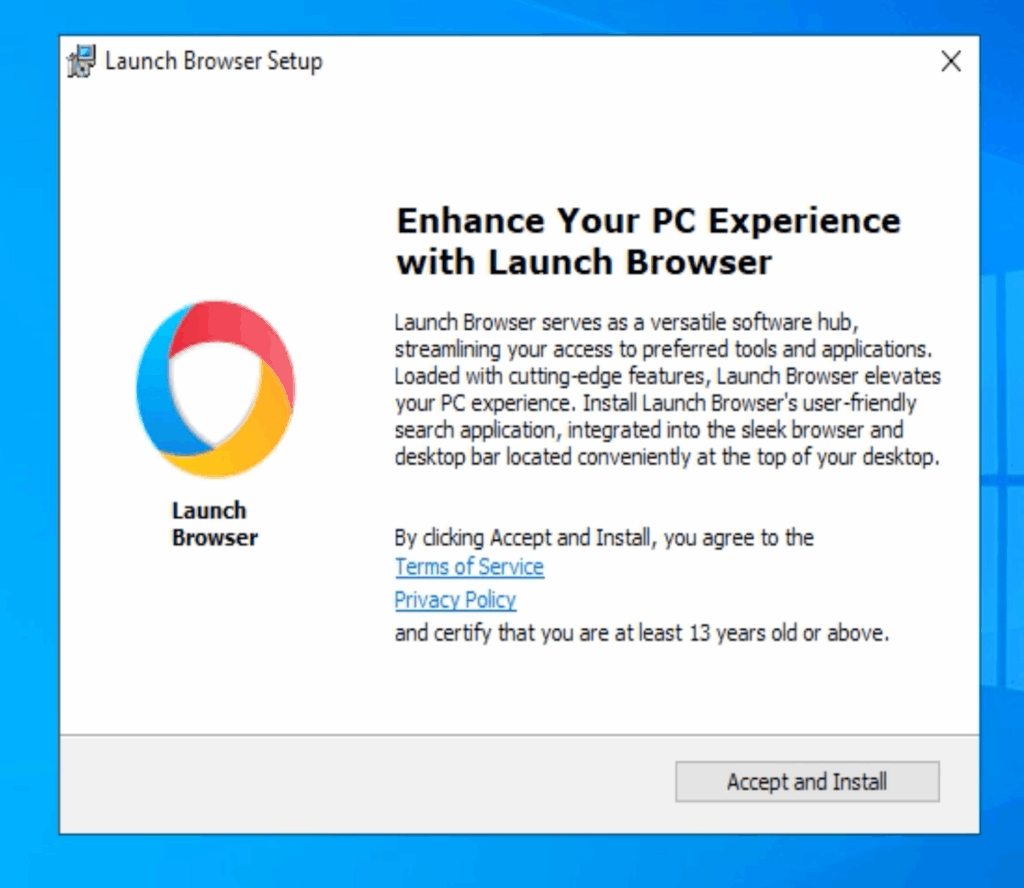
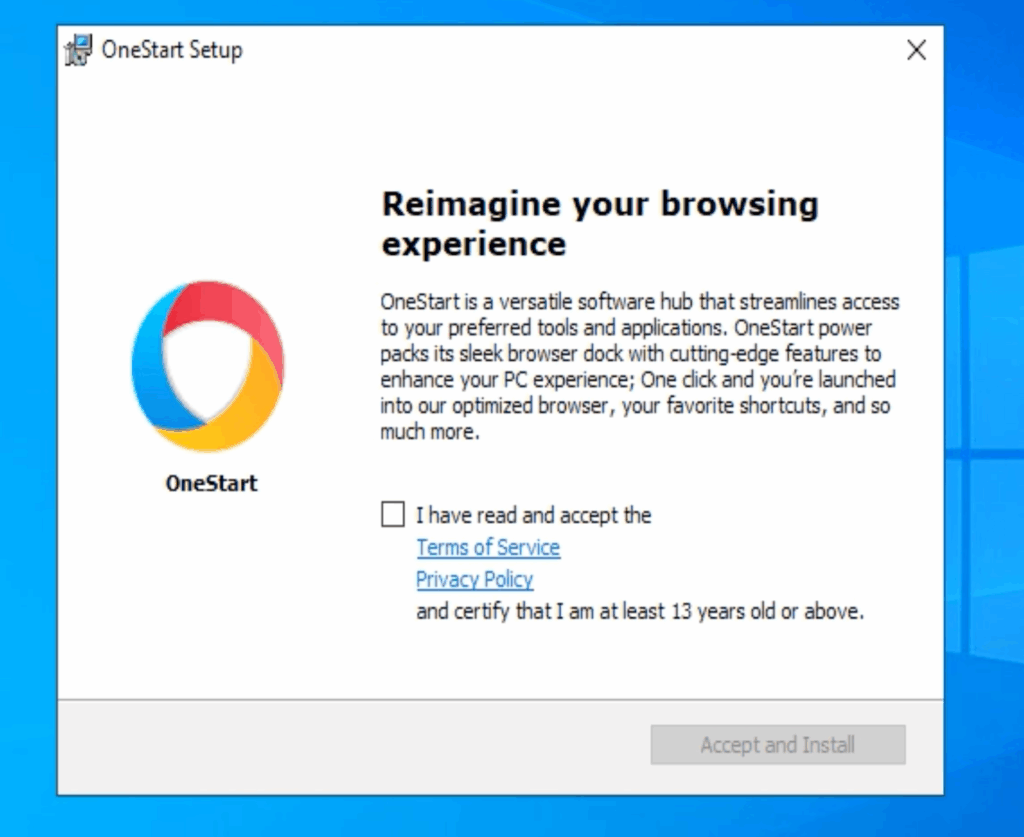
Table 4: Representative sample using another set of certificates
| File name | Example SHA256 | Signer (x509 CN) | Issuer | First VirusTotal Submission date |
|---|---|---|---|---|
| IEBrowserAssistantSetup.msi | 10acb7208a455b07940336a489f7c3cf34904f887b1f8904f5bff54569963f0b | ASTRAL MEDIA INC. | GlobalSign | 2023-06-19 |
| BAv1411302.msi | 3276154a7f2ea64e43cf6dbec33bfb20ee0d46b2ca03d5d0c7f51ec803f7101d | Astral Media Inc | SSL.com | 2024-05-29 |
| BAv1403298.msi | 35ab1c46e0341e6cda9ba1db61e8d8c0496df90ee758ed02d15f564a62b35da8 | Astral Media Inc. | DigiCert | 2022-03-29 |
| EasyQuickManuals_46736718.msi / PDFViewer_46586326.msi | 45fb5807dc1f88cb65dbfe611028ad09f1e85ab0ab244a1f691408c063851cc1 | Interlink Media Inc. | GlobalSign | 2024-02-02 |
| LaunchBrowserInstaller-v5.2.153.0.msi / PDFViewer_45578527.msi | 34c12da57921ab46ae9f06b321b3d47cc41d7bcb66d6635e3db58d3f6e7c4156 | Interlink Media Inc. | SSL.com | 2023-10-25 |
| PDFViewer_46214966.msi | e1d6ea166a0a09b4af4f697a0a88ff8b638f7f1738b0a5fa14f43bdf8e85739e | Blaze Media Inc | Sectigo | 2024-01-15 |
| PDFTools_12345678.msi | e505e4bc6c76f8ccd1d626832d1d5d5d2852a5c78016c43bdc2f502af6e40396 | Drake Media Inc | Entrust | 2024-06-27 |
| CSharpDLL.dll | 5bff84ba6e59086ca5ae880f0f299b59bc222a1e85f57ef620d5f725fc398ff8 | Blaze Media Inc | Sectigo | 2024-01-15 |
| DarkNet.dll | 162e65e8e74ed4637184a827629636f0c687c008e0937537fe32ca85ab21bd71 | Blaze Media Inc | Sectigo | 2024-01-15 |
| WindowsDisplayAPI.dll | 492193072be8c959112abd720360cedb24f564f27c375bf57346030b78b4db96 | Blaze Media Inc | Sectigo | 2024-01-15 |
| OperaSharpDLL.dll | 7ba95a9470697f33c5bd4e047253c2df035aedb96856126642af89c348bf3652 | Interlink Media Inc. | GlobalSign | 2024-01-26 |
| WebCompanion.dll | 3a3511aa0c7e42daa2b6467bdd6fd2006605c6a72667300ee3740df930be51d2 | Millennial Media Inc.* | DigiCert | 2022-09-02 |
*This cert was used only to sign Web Companion DLL. However, due to the actors’ use of certificates issued to similarly-named companies — namely, the ones seen in this table, which are all registered in Panama — we’re highly confident the certificate was theirs as well.
Not only PDF editors
While the above analysis focused on PDF editors, manual finders, and OneStart, the actor team didn’t just target users looking for this help. They also targeted broader audiences looking for games, wallpapers, and other software (note the re-use of “Drake Media Inc”). This time, it uses a certificate from GlobalSign, whereas above, Entrust issued it.
The team of malicious actors used the “Drake Media Inc” certificate to sign the file “EmuWCOfferSetup-1.0.0.110.msi” to VirusTotal, which was later distributed disguised as games. We suspect that the “EmuWCOfferSetup-1.0.0.110.msi” file was uploaded by the actors themselves; the name differs from the other uploads, follows the same version naming convention, and contains the acronym “WC”, which likely means “Web Companion,” as it also installs Web Companion.
We’ve seen these dynamically-named applications used by the Baoloader developers before. However, with the Baoloader malware specifically, the lures are normally productivity apps (PDF Editors and popular collaboration tools). And yet this time, there are also versions of the malware disguised as game installers.
Table 5: Representative sample using another set of certificates uploaded imitating game installers
| File name | Example SHA256 | Signer | Issuer | First VirusTotal Submission date |
|---|---|---|---|---|
| EmuWCOfferSetup-1.0.0.110.msi | aad5be480738f546f7538f70463f4144bb5654cf74bbf99aa9b5b2917164cbb4 | Drake Media Inc. | GlobalSign | 2023-11-06 |
| games_1329303.exe | 6b6fc62a294d5ef1c619d623f1cf6d735d9f191df9ef5c745b0881b1e01b8565 | Realistic Media Inc. | DigiCert | 2018-12-06 |
Chromeloader, is that you?
The early deviation into deploying games is interesting because this behavior is remarkably close to what we’ve seen of the malware “Chromeloader.” In fact, the malware shares many similarities, such as
- Heavy certificate abuse, including certificates for organizations with multiple issuers
- During lifetime, using payload to load Chrome extensions
- During lifetime, using node.exe to execute malicious JavaScript
- Use cloudfront domains in the first stage of the malware
- Use DGA or random domain names for second-stage command and control
- Use scheduled tasks for persistence mechanism
- Target both Windows and MacOS*
*BaoLoader’s MacOS targeting hasn’t been thoroughly explored. From what we identified, this was only found recently (the first submission was uploaded to VirusTotal on 2025-06-24). They recreated a ManualFinder app which received a developer ID that’s since been revoked. The developer ID is for “IENGINEERING PRIVATE LIMITED”.
However, our research leads us to believe that BaoLoader and Chromeloader are either completely unrelated or separate teams that work independently based on their certificate abuse trends. BaoLoader often uses certificates from Panama, Malaysia, and the US. Chromeloader often uses certificates from Israel, Germany, Great Britain, and Slovenia. Further, we didn’t observe the same certificates used across the two different malware.
For certificates used by Chromeloader, see certgraveyard.org/lookup?detail_type=malware&query=Chromeloader (requires GitHub login).
Not Chromeloader, but maybe TamperedChef?
The name TamperedChef became associated with BaoLoader after a tweet by Karsten Hahn. The tweet followed research from GDATA where TamperedChef was grouped into some other apps that have functional capabilities but fit the concept of a trojan. Like TamperedChef, AppSuite-PDF and other apps have been functional (for the most part). GDATA argues that this is due to AI enabling cybercriminals to create more convincing applications. The name TamperedChef started being applied to the campaign by accident and has now stuck. The original TamperedChef name was a joke name given to a different malware—a malware which offered a recipe app, but had covert means of communication, including hidden characters.
Image: Twitter user @ly7ine showing an example of hidden characters in a recipe.
This malware was distributed under a few different names, such as “RecipeLister,” “LookUpKitchen,” and “Fast-Forks” of which, “RecipeLister.exe” was the most common. After they were exposed by certificate revocation and public blogs, the actor moved onto a different theme: apps allowing users to search for pictures (see image below).
Image: Twitter user @HuntYethHounds shows the owner of Fast-Forks re-used the template of their website for a new website. The icon and favicon still show “Fast-Forks”.
TamperedChef’s use of hidden content in webpages differs significantly tactics used by BaoLoader. The two also differ in their use of code-signing certificates: TamperedChef used code-signing certificates issued to companies in Ukraine and Great Britain while BaoLoader consistently used certificates from Panama and Malaysia as mentioned above. We don’t see any connection linking the original TamperedChef and BaoLoader.
| File name | SHA256 hash | Signer | Issuer | First VirusTotal Submission date |
|---|---|---|---|---|
| RecipeLister.exe | 1619bcad3785be31ac2fdee0ab91392d08d9392032246e42673c3cb8964d4cb7 | Global Tech Allies ltd | SSL.com | 2025-05-06 |
| Forks.exe | d8bff72de51213510004a2652b9e31b48a25e2eb0d7184fab4ef9014fc85e145 | IT BRIDGE CONNECT LLC | GlobalSign | 2025-06-11 |
Why it matters
Code-signing certificates are intended to validate that software is from a known provider (and is likely safe). When software is signed and distributed by dozens of providers, it should raise suspicion. BaoLoader is an example of this, but went relatively unnoticed for years. It’s only the recent changes to their behavior that’s put their infrastructure and malware in the spotlight. However, their abuse of code-signing certificates has been a known issue, as evidenced by certificate providers revoking the certificates over the years.
Analysis of irregularities around code-signing can provide defenders early warning that something’s wrong. The clearest indicator is when the software, the metadata about the application, and the application itself don’t line up. This can help defenders identify malicious programs even when antivirus or other tools haven’t identified suspicious indicators. Code-signing certificates can also be used for threat hunting to identify files already known to be malicious by the security community.
Organizations should consider controls available to them to prevent unwanted and malicious software in their environment. Such unwanted software may be downloaded for many reasons—by accident from phishing emails, users attempting to download a PDF editing tool to help them do their job, or many other situations. However, many controls exist to help prevent these software—such as AppLocker for Windows—and application whitelisting. These tools play a vital part in keeping known (and stealthy) malicious files off systems.
Questions or additional insights regarding BaoLoader or any of the analysis detailed here? We’d love to hear from you. Reach out anytime at intel@expel.com.
Appendix
The following are the company details extracted from the code-signing certificates. In most certificates, the signer’s state, country, locality (region), and business serial number are available. Some columns have been removed for readability, but the full data can be viewed here: https://certgraveyard.org/lookup?detail_type=malware&query=BaoLoader and https://certgraveyard.org/lookup?detail_type=malware&query=OneStart.
| Signer | Issuer short | Valid start date | Country | Locality | RDN serial number |
|---|---|---|---|---|---|
| Apollo Technologies Inc | SSL.com | 7/28/23 | PA | Panama City | 155722923 |
| Astral Media Inc | SSL.com | 4/11/23 | PA | Panama City | 155704413 |
| Astral Media Inc. | DigiCert | 5/10/21 | PA | Panama City | 155704413 |
| ASTRAL MEDIA INC. | GlobalSign | 5/3/23 | PA | Panama City | 155704413 |
| Blaze Media Inc. | DigiCert | 9/19/22 | PA | Panama City | 155704406 |
| Caerus Media LLC | SSL.com | 9/04/24 | US | Delaware | 6125248 |
| Digital Promotions Sdn. Bhd. | GlobalSign | 3/6/24 | MY | Skudai | 1505433-P |
| Digital Promotions Sdn. Bhd. | SSL.com | 4/3/24 | MY | Skudai | 202301011511 |
| Digital Promotions Sdn. Bhd. | SSL.com | 6/15/23 | MY | Skudai | 202301011511 |
| Drake Media Inc | Entrust | 4/12/23 | PA | Panama City | 155704428 |
| Drake Media Inc | GlobalSign | 3/24/23 | PA | Cuidad de Panama | 155704428 |
| ECHO INFINI SDN. BHD. | SSL.com | 1/13/25 | MY | Skudai | 202401031184 |
| ECHO INFINI SDN. BHD. | SSL.com | 1/13/25 | MY | Skudai | 202401031184 |
| Echo Infini Sdn. Bhd. | GlobalSign | 12/9/24 | MY | Johor Bahru | 1577033-U |
| Eclipse Media Inc | SSL.com | 7/2/24 | PA | Panama City | 155704432 |
| Eclipse Media Inc. | DigiCert | 1/21/22 | PA | Panama City | 155704432 |
| ECLIPSE MEDIA INC. | Sectigo | 6/20/24 | PA | ?Not specified? | 155704432 |
| Eclipse Media Inc. | GlobalSign | 1/17/24 | PA | Panama City | 155704432-2-2021 |
| GLINT SOFTWARE SDN. BHD. | SSL.com | 4/24/25 | MY | Skudai | 202401011747 |
| INCREDIBLE MEDIA INC | GlobalSign | 4/18/24 | PA | Cuidad de Panama | 155722937 |
| Interlink Media Inc. | GlobalSign | 11/2/23 | PA | Cuidad de Panama | 155704402 |
| Interlink Media Inc. | SSL.com | 5/24/23 | PA | Panama City | 155704402 |
| Millennial Media Inc. | DigiCert | 2/28/22 | PA | Panama City | 155704409 |
| Onestart Technologies LLC | SSL.com | 3/6/25 | US | Delaware | 10070121 |
| Onestart Technologies LLC | DigiCert | 5/16/25 | US | Delaware | 10070121 |
| Realistic Media Inc. | DigiCert | 8/2/18 | VG | Road Town | 1817807 |




